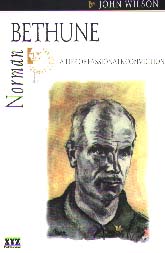|
________________
CM . . . .
Volume VI Number 18 . . . . May 12, 2000
excerpt: This was how Norman Bethune died, in a peasant's hut in the remote mountains of northern China. It was 5:20 on the morning of November 12, 1939.The pathos in the death of Dr. Norman Bethune sets the tone for this biography. A teenage reader will appreciate the immediacy of the wounded and the selfless heroics of Bethune before getting into any of the chronological detail. "Norman Bethune liked to have his photograph taken." is how Wilson opens Chapter 2, the beginning of his chronology of the life of Bethune. This statement is not only effective in introducing the many black and white photographs that illustrate the book, but it also evokes the man Bethune was. The photographs range from childhood to war shots, formal to informal portraits. Wilson is very skilled in his ability to flesh out Bethune as he tells the story of Bethune's youth, parents and interest in the war in Europe. Bethune was greatly affected by the wounded while he was a stretcher-bearer in the trenches of Ypres during World War I. Injured in France, he returned to Canada, attended university and received a degree in medicine. He practiced privately, but war was calling him. At the end of World War I, Bethune married Frances Campbell Penney. Their marriage was tumultuous, with them divorcing, remarrying and then divorcing again. Meanwhile, Bethune's extraordinary passion for medicine led him to discoveries in transfusions and in tuberculosis, but his personality made him difficult to work with. Within his unhappy personal life, Bethune oscillated between domestic practice and war doctor, offering his skill to the Red Cross in Spain and, from there, to China in 1938. Upon his death, he was honoured by the Chinese as an extraordinary man. In Canada, he was largely forgotten. Norman Bethune: A Life of Passionate Conviction is an intimate look at a charismatic individual who made a difference in the lives of many. Norman Bethune is not always "nice," but his conviction is genuine. A detailed "parallel" chronology compiled by Lynne Bowen is found at the book's end, and the columns juxtapose events in Bethune's life with world happenings. This biography, alive with the personality of Norman Bethune, is far from dull and stuffy. Recommended. Sandra Vincent is a teacher candidate and student of adolescent literature in the Faculty of Education, the University of Manitoba.
To comment on this title or this review, send mail to cm@umanitoba.ca.
Copyright © the Manitoba Library Association.
Reproduction for personal use is permitted only if this copyright notice
is maintained. Any other reproduction is prohibited without
permission.
Published by
TABLE OF CONTENTS FOR THIS ISSUE - May 12, 2000.
AUTHORS |
TITLES |
MEDIA REVIEWS |
PROFILES |
BACK ISSUES |
SEARCH |
CMARCHIVE |
HOME
|
